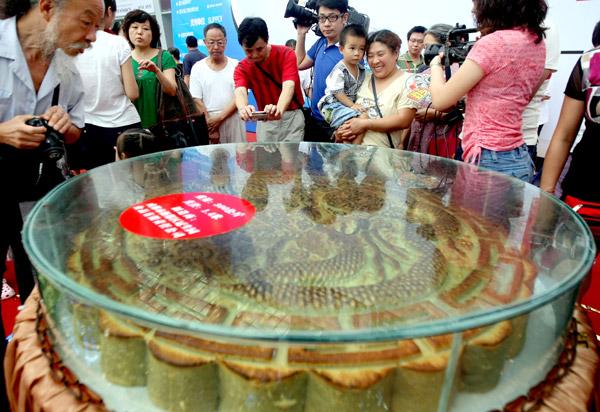
Visitors look at a huge moon cake exhibited in a food fair in Chengdu, Sichuan province, on Sunday. [Photo /China Daily]
The approach of the Mid-Autumn Festival has reignited debate about China's "mooncake tax."
Despite the tax having been levied for the past two years, grumble about the tax is growing as the festival nears. It falls on September 12 this year.
In 2009, the State Administration of Taxation stipulated that some allowances enjoyed by employees, including the mooncakes they receive from employers every year, would be subject to tax.
Tax authorities in Shanghai, Beijing and Nanjing recently reminded employers that the price of the mooncakes, a traditional food for the Chinese festival, should be included as part of the monthly salary of employees to calculate the tax they should pay.
The Beijing tax body even reminded companies that any company failing to do so would be fined up to three times the tax evaded by non-declaration of mooncakes.
In Shanghai, a staff member answering the city's 12366 taxation hotline stressed: "It is not a new rule at all." He said the stipulation was reasonable because the state tax body listed salary, allowances and bonuses as taxable income for individuals whether in cash, coupons or goods.
Traditional culture
However, most taxpayers think the rule is ridiculous and there has been a wave of online criticism.
More than 96 percent of Chinese employees said the tax body should impose no tax on mooncakes, according to an ongoing poll on weibo.com.
"Mooncakes are different from other allowances, because they are also a symbol of gratitude and encouragement to employees in the Chinese traditional culture, which should not be taxable," said Wang Yi from the Beijing Folk Custom Association.
The marked price of mooncakes, especially those in luxury wrapping, was always higher than their real value, so it would be unfair to ask the employees to pay tax according to the marked prices, said Walter Tong, a tax partner in accounting firm Ernst & Young.
"If mooncakes are taxable, many other items such as various coupons and commercial cards as well as daily commodities such as oil and rice, which are common allowances especially at state-owned enterprises, should also be taxable," Tong said.
The tax raised on mooncakes was a drop in the ocean as far as the country's tax revenue was concerned, and only increased the burden on middle and low income employees, said Vincent Zhi, a senior manager of accounting firm Deloitte Touche Tohmatsu.
He said the tax was in direct opposition to the country's decision to raise the personal income tax threshold to 3,500 yuan (US$539) from 2,000 yuan from Thursday.





